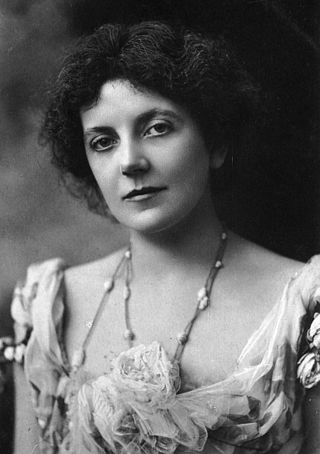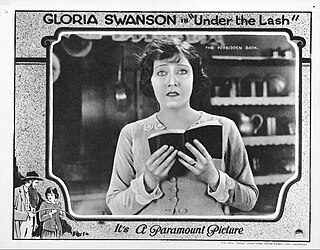
The Shubert Organization is a theatrical producing organization and a major owner of theatres based in Manhattan, New York City. It was founded by the three Shubert brothers in the late 19th century. They steadily expanded, owning many theaters in New York and across the United States. Since then it has gone through changes of ownership, but it is still a major theater chain.

Cicely Mary Hamilton, was an English actress, writer, journalist, suffragist and feminist, part of the struggle for women's suffrage in the United Kingdom. She is now best known for the feminist play How the Vote was Won, which sees a male anti-suffragist change his mind when the women in his life go on strike. She was also the author of one of the most frequently performed suffrage plays, A Pageant of Great Women (1909), which featured the character of Jane Austen as one of its "Learned Women."

Lena Margaret Ashwell, Lady Simson was a British actress and theatre manager and producer, known as the first to organise large-scale entertainment for troops at the front, which she did during World War I. After the war she created the Lena Ashwell Players.
The Shubert family was responsible for the establishment of the Broadway district, in New York City, as the hub of the theatre industry in the United States. They dominated the legitimate theater and vaudeville in the first half of the 20th century, promoting entertainment attuned to popular taste.

Julia Kathleen Nancy McKenzie is an English actress, singer, presenter, and theatre director. She has premièred leading roles written by both Alan Ayckbourn and Stephen Sondheim. On television, she is known for her BAFTA Award nominated role as Hester Fields in the sitcom Fresh Fields (1984–1986) and its sequel French Fields (1989–1991), and as Miss Marple in Agatha Christie's Marple (2009–2013).

Edward Knoblock was a playwright and novelist, originally American and later a naturalised British citizen. He wrote numerous plays, often at the rate of two or three a year, of which the most successful were Kismet (1911) and Milestones. Many of his plays were collaborations, with, among others, Vicki Baum, Beverley Nichols, J. B. Priestley and Vita Sackville-West.

Beryl Mercer was a Spanish-born American actress of stage and screen who was based in the United States.

Under the Lash is a 1921 American silent drama film directed by Sam Wood and starring Gloria Swanson. The film is based on the 1906 play The Shulamite by Claude Askew and Edward Knoblock, and the 1904 novel of the same name by Alice and Claude Askew. The film is lost with no copies of it existing in any archives.
Esme Church was a British actress and theatre director. In a long career she acted with the Old Vic Company, the Royal Shakespeare Company and on Broadway. She directed plays for the Old Vic, became head of the Old Vic Theatre School and then director of the Bradford Civic Playhouse, with its associated Northern Theatre School.

Arthur Wyndham Playfair was an English actor and singer. Beginning in Victorian burlesque and comic operas, Playfair became known for his roles in Edwardian musical comedy and, later, in musical revues.

Rosemary Frances Rees was a New Zealand actress, playwright, theatre producer and novelist. She worked in New Zealand, Australia and England. After her career in theatre she became a romantic novelist.

Alice Askew, née Leake along with her husband, Claude Askew were British authors, who together wrote "over ninety novels, many published in sixpenny and sevenpenny series, between 1904 and 1918".
Jesse C. Huffman (1869–1935) was an American theatrical director. Between 1906 and 1932 he directed or staged over 200 shows, mostly for the Shubert Brothers. Many of them were musical revues, musicals or operettas. He is known for The Passing Show series of revues that he staged from 1914 to 1924 at the Winter Garden Theatre on Broadway, daring alternatives to the Ziegfeld Follies.

Vera Michelena was an American actress, contralto prima donna and dancer who appeared in light opera, musical comedy, vaudeville and silent film. She was perhaps best remembered for her starring roles in the musicals The Princess Chic, Flo Flo and The Waltz Dream, her rendition of the vampire dance in the musical Take It from Me and as a Ziegfeld Follies performer.

Clytie May Hine, was an Australian-born operatic soprano who became a renowned voice teacher in New York.
The Shulamite, also known as The Folly of Desire, a 1915 British silent drama film directed by George Loane Tucker and starring Norman McKinnel, Manora Thew and Gerald Ames. It is based on the 1906 play of the same name by Edward Knoblock. Prints and/or fragments were found in the Dawson Film Find in 1978.
Eunice Crowther was a British singer, dancer, and choreographer, who in the early part of her career worked on stage, before moving on to television work for the BBC in the late 1940s. In the 1950s she became a dance director.

Martha Caroline Theresa Lorber was an American dancer, actress, singer, model, and Ziegfeld Girl.
Catherine Rodger Ball, known professionally as Marion Fawcett, was a British actress and theatre producer and director.

Edna Leedom Doelger was an American actress, who appeared in Broadway productions during the 1920s.















